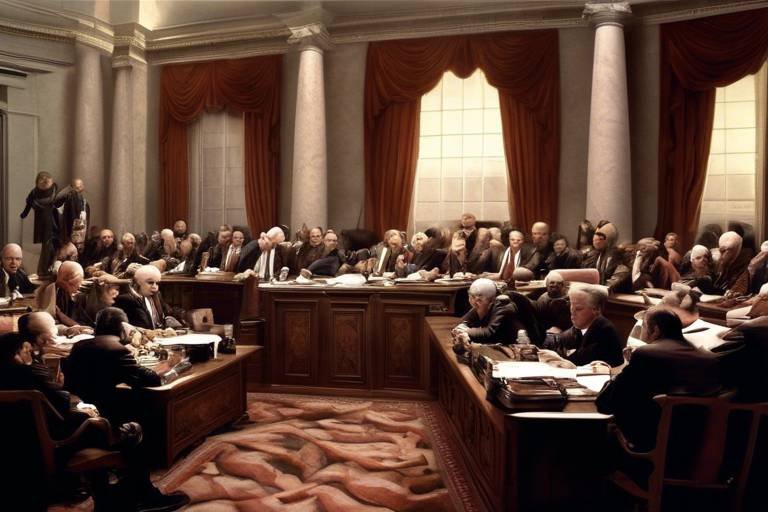Political Implications of Socratic Philosophy
Socratic philosophy, rooted in the teachings of Socrates, holds a profound influence on modern political thought. It invites us to ponder essential questions about governance, ethics, and civic engagement. This article delves into how Socratic principles can reshape our understanding of politics today. Imagine a world where political discourse is driven not by sound bites but by genuine dialogue—where leaders and citizens engage in meaningful conversations that foster understanding and collaboration. This is the essence of the Socratic method, which serves as a powerful tool to navigate the complexities of contemporary governance.
At its core, Socratic philosophy emphasizes the importance of ethics in political life. It challenges us to reflect on the moral integrity of our leaders and the impact of their decisions on the common good. In a time when political ambition often overshadows ethical considerations, Socratic thought urges us to prioritize virtue over power. It raises critical questions: Are our leaders acting in the best interest of society? Are they accountable to the values we hold dear? By examining these questions through a Socratic lens, we can cultivate a more just and equitable political landscape.
Moreover, the Socratic concept of virtue extends beyond individual leaders; it underscores the necessity of a virtuous citizenry. Socrates believed that a society's well-being hinges on the ethical character of its citizens. This idea resonates in modern discussions about civic responsibility and political participation. When citizens are informed and engaged, they contribute to a robust democracy that reflects the values of the community. Thus, fostering an environment where ethical reasoning is prioritized in education and public discourse is paramount.
In addition, the role of dialogue in politics cannot be overstated. Socratic dialogue encourages open communication and understanding among diverse political viewpoints. It is through such exchanges that we can resolve conflicts and build consensus in society. In a world often divided by partisan lines, the ability to engage in respectful and constructive dialogue is essential for a thriving democracy. By embracing the Socratic method, we can transform political discussions into opportunities for learning and growth, rather than battlegrounds for ideological clashes.
As we explore the implications of Socratic philosophy on justice and the ideal state, we find that fairness and equality are fundamental tenets. Socrates' vision informs contemporary debates about what constitutes a just society. His ideas challenge us to consider the role of law in achieving justice and the necessity of wise and virtuous leaders. The notion of philosopher-kings, as articulated by Plato, reflects this ideal, suggesting that those who govern should possess both wisdom and moral integrity.
However, Socratic philosophy does not shy away from critiquing power. It fosters a healthy skepticism towards authority, urging citizens to question the dynamics of power and the potential for corruption within political systems. This critical examination promotes accountability and transparency, essential elements in any democratic society. By encouraging citizens to hold their leaders accountable, Socratic thought contributes to a more robust and resilient political framework.
In conclusion, the political implications of Socratic philosophy are vast and deeply relevant in today's world. By embracing the principles of dialogue, ethics, and virtue, we can foster a more engaged and responsible citizenry. Socratic philosophy not only enriches our understanding of governance but also empowers us to actively participate in shaping a just society. As we navigate the complexities of modern politics, let us draw inspiration from Socratic ideals to cultivate a political landscape that prioritizes the common good and nurtures the virtues of its citizens.
- What is the Socratic method? The Socratic method is a form of dialogue characterized by asking and answering questions to stimulate critical thinking and illuminate ideas.
- How does Socratic philosophy influence modern governance? Socratic philosophy emphasizes ethics, dialogue, and the importance of virtue, which are essential for accountable and responsible governance.
- Why is citizen participation important in a democracy? Active citizen participation ensures that the government reflects the values and needs of the community, fostering a healthier democratic process.
- What does Socratic philosophy say about power? Socratic philosophy encourages skepticism towards authority, promoting critical examination of power dynamics and advocating for accountability.

The Socratic Method in Politics
The Socratic method is not just a philosophical tool; it’s a transformative approach that can reshape the landscape of political discourse. Imagine stepping into a room filled with diverse opinions, where instead of shouting over one another, people engage in a thoughtful dialogue. This method, characterized by systematic questioning and dialogue, encourages individuals to critically evaluate their beliefs and the beliefs of others. It’s like peeling an onion—layer by layer, you uncover deeper truths that might otherwise remain hidden beneath the surface.
In politics, the Socratic method can bridge the gap between conflicting viewpoints. When politicians and citizens alike engage in this kind of dialogue, they foster a culture of understanding and collaboration. It’s not merely about winning an argument; it’s about seeking the truth together. This approach can lead to more informed decisions, as participants are compelled to think critically about their positions. By questioning assumptions and exploring the reasoning behind various policies, a more nuanced understanding of complex issues emerges.
Moreover, the Socratic method encourages active listening—a skill that seems to be dwindling in today’s fast-paced, soundbite-driven political environment. When individuals practice active listening, they begin to appreciate the perspectives of others, even if they don’t agree with them. This can create a more inclusive political atmosphere where diverse voices are heard, valued, and respected. The result? A healthier democracy where dialogue replaces divisiveness.
Consider the implications of this method on civic engagement. When citizens feel empowered to ask questions and challenge the status quo, they become more than just passive observers in the political process. They become active participants, equipped with the tools to engage thoughtfully in discussions about governance and policy. This shift from passive consumption of information to active inquiry is crucial in fostering a politically aware and engaged populace.
To illustrate the impact of the Socratic method in politics, let’s look at a hypothetical scenario:
| Scenario | Traditional Approach | Socratic Approach |
|---|---|---|
| Community Meeting on Local Policy | Leaders present their plans, and citizens voice their opposition. | Leaders facilitate discussion, asking citizens questions about their concerns and beliefs. |
| Debate on a New Law | Politicians argue their points, often interrupting each other. | Politicians engage in a dialogue, asking each other clarifying questions to understand different viewpoints. |
| Public Opinion Polls | Citizens respond to questions without context. | Citizens discuss their opinions in a group, guided by questions that explore the reasoning behind their beliefs. |
As this table shows, the Socratic method encourages a more engaging and participatory form of political discourse. It’s not just about what is said; it’s about how it’s said and the depth of understanding that can be achieved through questioning and dialogue.
In conclusion, the Socratic method serves as a powerful tool in politics, promoting critical thinking and fostering a culture of dialogue. By embracing this approach, we can encourage a political environment where citizens are not only informed but also engaged, ultimately leading to a more vibrant and effective democracy.
- What is the Socratic method? The Socratic method is a form of cooperative argumentative dialogue that stimulates critical thinking through questioning.
- How can the Socratic method improve political discourse? It encourages open dialogue, promotes understanding, and helps individuals critically evaluate their beliefs.
- Why is active listening important in politics? Active listening fosters respect for diverse opinions and leads to more constructive discussions.
- Can the Socratic method be applied in everyday political discussions? Absolutely! It can be used in community meetings, debates, and even casual conversations about political issues.

Ethics and Governance
The intersection of ethics and governance is a cornerstone of Socratic philosophy, which emphasizes that the moral integrity of leaders is paramount for a thriving society. Socrates believed that leaders should not merely be power-hungry individuals seeking personal gain; instead, they should be individuals committed to the common good. In a world where political power often seems synonymous with corruption, Socratic thought offers a refreshing perspective, urging us to reflect on the ethical responsibilities of those in power.
At the heart of this philosophy lies the idea that ethical governance is not just a lofty ideal but a practical necessity. When leaders prioritize ethics, they foster trust among citizens, which is essential for a functional democracy. A government that operates on ethical principles is likely to be more transparent, accountable, and responsive to the needs of its people. This approach can be contrasted with systems where power is wielded without regard for ethical considerations, often leading to widespread disenchantment and disengagement among the populace.
Moreover, Socratic philosophy encourages leaders to engage in self-examination and critical questioning of their motives and decisions. This introspective approach can be likened to a compass guiding leaders toward the right path, ensuring that their choices reflect both ethical standards and the aspirations of the community. In this context, ethical governance can be seen as a collaborative effort involving not just leaders but also citizens who are informed and engaged.
To illustrate the significance of ethics in governance, consider the following key points:
- Accountability: Ethical leaders are more likely to hold themselves accountable for their actions, which in turn encourages citizens to demand the same from their representatives.
- Public Trust: When leaders act ethically, they build trust within the community, which is crucial for social cohesion and civic engagement.
- Long-term Vision: Ethical governance focuses on sustainable policies that benefit future generations, rather than short-term gains.
In essence, Socratic philosophy posits that ethical governance is foundational to a just society. It challenges us to ask difficult questions: What does it mean to lead ethically? How can we ensure that our leaders remain committed to the common good? These questions are not just philosophical musings; they are vital for the health of our democracies today.
In Socratic thought, the concept of virtue is not merely an abstract idea; it is a practical foundation for political life. The belief is that a virtuous citizenry is essential for a just society. This notion has profound implications for modern views on civic responsibility and political participation. When citizens embody virtues such as justice, courage, and wisdom, they contribute to a political landscape that encourages ethical governance. This creates a feedback loop where virtuous citizens demand virtuous leaders, and in turn, those leaders inspire their constituents to uphold similar standards.
Consequently, the cultivation of virtue should be a priority in our educational systems, as Socrates believed that education plays a crucial role in shaping ethical leaders. By promoting ethical reasoning and civic engagement, we can prepare future generations to navigate the complexities of governance with integrity and purpose.
Moreover, Socratic principles emphasize the importance of active citizen participation in politics. Socrates famously stated that an unexamined life is not worth living, and this applies equally to the political realm. Informed and engaged citizens are vital for a healthy democracy. They serve as watchdogs, ensuring that their leaders remain accountable and focused on the common good. Encouraging active participation can be achieved through various means, such as community discussions, public forums, and educational initiatives aimed at increasing political literacy.
Ultimately, the Socratic emphasis on ethics in governance serves as a powerful reminder that the health of our political systems relies on the moral integrity of both leaders and citizens. By fostering a culture of ethical governance, we can work towards a society that not only values but actively practices justice, fairness, and the common good.
- What is the Socratic Method? The Socratic Method is a form of dialogue that involves asking and answering questions to stimulate critical thinking and illuminate ideas.
- How does ethics influence governance? Ethics shapes the decision-making processes of leaders, ensuring they act in the best interest of the community rather than for personal gain.
- Why is citizen participation important? Active participation ensures that the voices of the populace are heard, fostering accountability and transparency in governance.

Virtue as a Political Foundation
At the heart of Socratic philosophy lies the concept of virtue, which serves as a crucial foundation for any just society. Socrates believed that a society's moral fabric is woven from the virtues of its citizens. If we think of a community as a garden, then virtue can be seen as the rich soil that nourishes the plants. Without it, no matter how much sunlight or water the garden receives, it will struggle to thrive. In contemporary political thought, the idea of virtue is more relevant than ever, as it challenges us to reflect on what it means to be a good citizen and how we can cultivate a political environment that prioritizes the common good over self-interest.
Virtue encompasses qualities such as honesty, integrity, and compassion. When citizens embody these virtues, they contribute to a political landscape that values collaboration and understanding. Imagine a community where leaders are not just motivated by personal gain but are genuinely invested in the welfare of their constituents. This ideal is not merely a utopian dream; it can be our reality if we prioritize virtue in our political discourse. The question then arises: how can we encourage a virtuous citizenry? One method is through education, which Socrates championed as a means to cultivate moral reasoning and ethical behavior.
Moreover, the Socratic emphasis on virtue has profound implications for civic responsibility. It suggests that being a good citizen is not just about voting or attending town hall meetings; it's about actively engaging in the community and holding leaders accountable. Citizens must ask themselves: are we living up to the virtues that we expect from our leaders? This reciprocal relationship between the governed and those in power is vital for a thriving democracy.
To illustrate the importance of virtue in political foundations, consider the following table that outlines the virtues essential for political engagement:
| Virtue | Description | Impact on Society |
|---|---|---|
| Honesty | Truthfulness in communication and actions | Builds trust between citizens and leaders |
| Integrity | Adherence to moral and ethical principles | Encourages accountability and transparency |
| Compassion | Empathy towards others' experiences and struggles | Fosters community and cooperation |
In conclusion, the Socratic view of virtue as a political foundation is not just an ancient concept; it is a call to action for modern society. By nurturing virtues within ourselves and our communities, we can create a political environment that is not only just but also vibrant and inclusive. The path to a better society is paved with the actions of virtuous citizens, and it is our collective responsibility to embody these ideals in our daily lives.
- What is the Socratic method? The Socratic method is a form of cooperative argumentative dialogue that stimulates critical thinking and illuminates ideas.
- Why is virtue important in politics? Virtue is essential in politics as it fosters trust, accountability, and a commitment to the common good among citizens and leaders.
- How can citizens cultivate virtue? Citizens can cultivate virtue through education, community engagement, and by holding themselves and their leaders accountable.

Education for Virtue
Socrates firmly believed that education is not merely about imparting knowledge but is a vital tool for cultivating virtue within individuals. In his view, a well-rounded education should aim to develop not just the intellect but also the moral character of students. Imagine a garden where each plant represents a different virtue; the role of education is akin to the gardener who nurtures these plants, ensuring they grow strong and healthy. Without this nurturing, the garden may wilt, just as society can falter without virtuous citizens.
To achieve this vision, educational systems must prioritize ethical reasoning and civic engagement. This means incorporating lessons that challenge students to think critically about their values and the implications of their actions. For instance, discussions around ethical dilemmas can help students navigate complex moral landscapes. By engaging in debates and dialogues, students learn to articulate their beliefs while also considering opposing viewpoints, which is essential for developing a well-rounded perspective.
Moreover, Socratic education emphasizes the importance of active participation in the learning process. Rather than being passive recipients of information, students should be encouraged to ask questions, challenge assumptions, and seek deeper understanding. This method not only fosters intellectual growth but also instills a sense of responsibility towards the community. After all, a citizen who understands the value of virtue is more likely to act in the best interest of society.
In contemporary contexts, this approach can be manifested in various ways:
- Service Learning: Integrating community service into the curriculum helps students apply their knowledge while contributing to the common good.
- Ethics Courses: Specialized courses focused on ethics can provide students with frameworks to navigate moral challenges in their personal and professional lives.
- Collaborative Projects: Group work encourages students to collaborate, fostering a sense of community and shared responsibility.
Ultimately, the goal of education for virtue is to create not just knowledgeable individuals but also ethical leaders who can guide society towards a more just and equitable future. As we reflect on the Socratic ideals, it becomes clear that the responsibility lies not only with educators but also with society as a whole to cultivate environments where virtue can thrive.
Q1: What is the Socratic method in education?
A1: The Socratic method in education involves fostering dialogue and critical questioning, encouraging students to explore ideas deeply and articulate their thoughts.
Q2: How can education promote civic engagement?
A2: Education can promote civic engagement by incorporating service learning, ethics discussions, and opportunities for students to participate in community projects.
Q3: Why is virtue important in leadership?
A3: Virtue is crucial in leadership as it ensures that leaders prioritize the common good over personal ambition, fostering trust and integrity within the community.

Citizen Participation
Citizen participation is not just a buzzword; it's the lifeblood of a thriving democracy. Imagine a garden where every flower has a role to play in creating a vibrant ecosystem. Similarly, in politics, every citizen's voice contributes to the overall health of society. Socratic principles emphasize that active engagement is essential for a functioning political system. When citizens participate, they become more than just passive observers; they transform into informed stakeholders who can influence decisions that affect their lives.
But how do we cultivate this participation? The answer lies in fostering an environment where dialogue and discussion are encouraged. Socrates believed in the power of questioning, and this approach can be applied to modern civic engagement. By asking the right questions, citizens can challenge the status quo and demand accountability from their leaders. This not only empowers individuals but also builds a community that values collaboration and mutual respect. Think of it like a team sport; every player must contribute for the team to win.
Moreover, the role of technology cannot be overlooked in enhancing citizen participation. With the rise of social media and online platforms, individuals have unprecedented access to information and the ability to connect with others. This digital landscape allows for a broader exchange of ideas and opinions, making it easier for citizens to mobilize around issues that matter to them. Whether it's through online petitions, community forums, or social media campaigns, the tools for engagement are at our fingertips.
However, it's crucial to recognize that participation isn't merely about showing up; it's about being informed and engaged. Citizens must educate themselves on the issues at hand and understand the implications of their involvement. This is where the educational aspect of Socratic philosophy comes into play. By prioritizing ethical reasoning and critical thinking in educational systems, we can prepare future generations to be active participants in their democracy.
In conclusion, citizen participation is a cornerstone of a healthy political landscape. It requires a commitment from both individuals and institutions to create a culture of engagement, where every voice is valued, and every opinion matters. As we move forward, let us remember that the strength of our democracy lies in the active involvement of its citizens. After all, just like in Socratic dialogue, the best ideas often emerge when we listen to one another and engage in meaningful conversations.
- What is citizen participation? Citizen participation refers to the active involvement of individuals in the political process, including voting, advocacy, and community engagement.
- Why is citizen participation important? It ensures that the voices of the community are heard, promotes accountability, and strengthens democracy.
- How can citizens participate in politics? Citizens can engage through voting, attending town hall meetings, joining advocacy groups, or utilizing social media to raise awareness about issues.
- What role does education play in citizen participation? Education fosters critical thinking and ethical reasoning, equipping individuals with the knowledge and skills needed to engage effectively in political discourse.

The Role of Dialogue in Politics
Dialogue is the lifeblood of any healthy political system. It’s not just about exchanging words; it’s about building bridges between differing perspectives. Imagine a bustling marketplace where each stall represents a unique viewpoint, and the customers—citizens—are free to wander, explore, and engage. This vibrant exchange is what Socratic philosophy champions. Through the Socratic method, which emphasizes questioning and dialogue, we can foster a culture where ideas are not just thrown around like confetti, but are carefully examined and discussed.
In the political arena, dialogue serves several crucial purposes. First, it encourages understanding. When politicians and citizens engage in meaningful conversations, they can better grasp the complexities of issues at hand. This understanding is vital, as it allows for more informed decision-making. When people feel heard and understood, they are more likely to participate actively in the political process. It’s like tuning into a favorite radio station; once you find the right frequency, everything becomes clearer and more enjoyable.
Moreover, dialogue is essential for conflict resolution. In a world filled with diverse opinions and beliefs, disagreements are inevitable. However, through open dialogue, conflicting parties can find common ground. This is particularly important in today’s polarized political climate, where shouting matches often drown out reasoned discussion. By prioritizing dialogue, we can transform adversarial relationships into collaborative partnerships, paving the way for more effective governance.
Additionally, the Socratic emphasis on questioning can help dismantle echo chambers—those comfortable spaces where we only hear opinions that mirror our own. Engaging with opposing viewpoints not only enriches our understanding but also challenges our assumptions. It’s like taking off a pair of blinders; suddenly, the world is much broader and more colorful. This kind of engagement is crucial for a vibrant democracy, where the strength of the system lies in its ability to accommodate a multitude of voices.
To illustrate the impact of dialogue in politics, consider the following table, which outlines the key benefits:
| Benefit | Description |
|---|---|
| Enhanced Understanding | Facilitates a deeper grasp of complex issues among citizens and leaders. |
| Conflict Resolution | Encourages collaboration and finding common ground amidst disagreements. |
| Reduction of Polarization | Helps break down echo chambers, fostering a more inclusive political environment. |
| Empowerment of Citizens | Encourages active participation and engagement in the political process. |
In conclusion, the role of dialogue in politics cannot be overstated. It’s not just a tool for communication; it’s a fundamental principle that can shape the very fabric of our political landscape. By embracing dialogue, we can create a more inclusive, understanding, and ultimately effective political system. So, the next time you find yourself in a discussion about politics, remember: it’s not just about what you say, but how you engage with others that truly matters.
- What is the Socratic method? The Socratic method is a form of cooperative argumentative dialogue that stimulates critical thinking through asking and answering questions.
- Why is dialogue important in politics? Dialogue fosters understanding, resolves conflicts, reduces polarization, and empowers citizens to participate actively in governance.
- How can citizens encourage dialogue? Citizens can encourage dialogue by engaging with diverse viewpoints, asking questions, and participating in community discussions.

Justice and the Ideal State
The concept of justice has been a cornerstone of political philosophy for centuries, and Socratic thought provides a profound lens through which to examine this vital issue. Socrates, through his dialogues, often posed questions that challenged the status quo, urging individuals to reflect on the nature of justice and its implications for governance. He believed that a just society is not merely a collection of laws but a harmonious community where fairness and equality prevail. This perspective is particularly relevant today as we grapple with issues of inequality and injustice in various forms.
Socrates’ vision of the ideal state is one where justice is not just an abstract principle but a lived reality. He argued that justice must be rooted in the character of both the leaders and the citizens. In this context, the state is seen as a reflection of its people; thus, the moral integrity of its citizens directly influences the health of the political system. This leads us to consider the role of virtue in governance. A society where citizens embody virtues such as honesty, courage, and empathy is likely to foster a political environment that prioritizes the common good over individual interests.
Moreover, Socratic philosophy emphasizes the importance of the rule of law as a foundation for justice. Laws should not only serve to maintain order but also to promote fairness and protect the rights of all individuals. In this ideal state, laws are crafted through a process of rational dialogue and consensus, ensuring that they reflect the collective values of the community. This is where the Socratic method of questioning comes into play, as it encourages citizens to engage in discussions that critically assess the laws and policies that govern them.
As we reflect on these principles, it’s essential to recognize the modern implications of Socratic thought on justice and governance. Today, many societies are still striving to achieve this ideal state. For instance, movements advocating for social justice, equality, and human rights echo Socratic ideals, pushing for a political landscape where everyone has a voice and a stake in the decision-making process. The challenge lies in the realization that achieving justice is not a destination but an ongoing journey that requires active participation and vigilance from all members of society.
In summary, Socratic philosophy invites us to continuously question and redefine our understanding of justice and the ideal state. By fostering a culture of dialogue, encouraging civic engagement, and promoting ethical leadership, we can work towards a political system that embodies the principles of fairness and equality. As we navigate the complexities of contemporary governance, let us remember the Socratic call to seek wisdom and virtue, ensuring that our political structures serve not just the powerful, but all members of society.
- What is the Socratic view of justice? Socratic philosophy views justice as a fundamental virtue that should underpin all aspects of governance, emphasizing fairness, equality, and moral integrity.
- How does the Socratic method apply to modern politics? The Socratic method encourages critical dialogue and questioning, which can lead to more informed and engaged citizens, essential for a healthy democracy.
- Why is citizen participation important in achieving justice? Active citizen participation ensures that the voices of all community members are heard, fostering a political environment that prioritizes the common good.
- What role do laws play in a just society? Laws should promote fairness and protect individual rights, reflecting the collective values of the community while being subject to critical examination.

Philosopher-Kings
The concept of is one of the most intriguing aspects of Socratic philosophy, primarily articulated through the works of Plato, Socrates’ most famous student. Imagine a ruler who is not just a politician, but a wise sage, someone who understands the essence of justice, virtue, and the common good. This ideal leader is not driven by personal ambition or the pursuit of power, but rather by a profound commitment to the welfare of the state and its citizens. In this framework, the philosopher-king stands as a beacon of hope, illuminating the path toward a just society.
Plato argued that only those who have achieved a deep understanding of philosophical concepts should govern. This is because they possess the knowledge to discern what is truly beneficial for the populace. In a world where political leaders often prioritize their interests over those of the people, the idea of philosopher-kings serves as a refreshing reminder of what governance could be. It raises essential questions: What if our leaders were genuinely wise? What if they sought knowledge above all else? Would our political landscape be transformed?
To better understand the philosopher-king concept, let’s break down its core attributes:
- Wisdom: A philosopher-king must possess profound knowledge and wisdom, enabling them to make informed decisions that benefit society.
- Virtue: They should embody moral integrity, ensuring that their actions align with ethical principles.
- Commitment to the Common Good: Their primary focus should be on the welfare of the state and its citizens, rather than personal gain.
These attributes highlight the stark contrast between the philosopher-king and the typical politician. While many leaders are often swayed by public opinion, personal interests, or the pursuit of power, a philosopher-king remains grounded in the pursuit of knowledge and virtue. This ideal raises an interesting dilemma in contemporary politics: Can we cultivate leaders who embody these qualities, or are we forever bound to the cycles of self-interest and corruption?
However, the notion of philosopher-kings is not without its critiques. Some argue that placing too much power in the hands of a single wise individual could lead to authoritarianism. Critics question whether any one person can truly embody the wisdom required to govern effectively. To address these concerns, it’s essential to consider how philosopher-kings can operate within a system of checks and balances, ensuring that their power is tempered by accountability and transparency.
In conclusion, the idea of philosopher-kings invites us to rethink our expectations of political leadership. It challenges us to envision a world where leaders are not only knowledgeable but also deeply committed to ethical governance. As we navigate the complexities of modern politics, perhaps we should strive to support candidates who reflect these Socratic ideals. After all, a society led by philosopher-kings might just be the key to achieving a more just and equitable world.
- What is a philosopher-king? A philosopher-king is a ruler who possesses both wisdom and virtue, governing not for personal gain but for the common good.
- Why is the concept of philosopher-kings important? It emphasizes the need for knowledgeable and ethical leadership in politics, contrasting with self-interested governance.
- Can philosopher-kings exist in modern politics? While challenging, it is possible to cultivate leaders who embody the ideals of wisdom and virtue through education and civic engagement.
- What are the potential downsides of philosopher-kings? Critics argue that concentrating power in one wise individual could lead to authoritarianism, highlighting the need for checks and balances.

Critiques of Power
The Socratic philosophy has a profound impact on how we view and critique power structures within our societies. Socrates himself was known for his relentless questioning of authority and societal norms, which serves as a powerful reminder of the importance of skepticism in governance. He believed that power, when unchecked, has the potential to corrupt even the most well-intentioned leaders. This idea resonates deeply in today's political landscape, where we often witness leaders who stray from their original missions, driven instead by personal ambition or external pressures. The Socratic critique of power encourages us to remain vigilant, questioning not just the actions of those in authority but also the systems that allow such power to exist.
In the spirit of Socratic dialogue, we can categorize critiques of power into several key themes:
- Accountability: Socrates emphasized the need for leaders to be accountable to the people they serve. This is crucial in ensuring that power is exercised responsibly and ethically.
- Transparency: A transparent government allows citizens to see the decision-making processes, which can help prevent abuses of power. Socratic thought advocates for open dialogue and communication as a means to achieve this.
- Ethical Leadership: Socrates believed that leaders should possess virtue and moral integrity. This principle underlines the need for ethical standards in political leadership today.
Moreover, Socrates' method of questioning serves as a tool for citizens to engage with their leaders. By asking probing questions, individuals can challenge the status quo and demand clarity on policies and decisions that affect their lives. This practice not only empowers citizens but also fosters a culture of accountability among those in power. In a democratic society, the ability to question and critique authority is vital; it is the bedrock of a healthy political discourse.
However, the critique of power is not just about challenging leaders; it also involves examining the systems that uphold these power dynamics. Socratic philosophy encourages us to look beyond individual actions and consider the broader implications of governance structures. For instance, we must ask ourselves: Are our political systems designed to serve the common good, or do they primarily benefit a select few? This critical examination can lead to significant reforms that align political practices with the ideals of justice and equity.
In conclusion, the Socratic critique of power remains relevant today, urging us to question authority and demand accountability. By embracing this philosophical approach, we can foster a more engaged and informed citizenry, ultimately leading to a political landscape that reflects the values of fairness and integrity. As we navigate the complexities of modern governance, let us remember Socrates' wisdom and strive to hold our leaders to the highest standards, ensuring that power is wielded not for personal gain but for the benefit of all.
- What is the Socratic method? The Socratic method is a form of cooperative argumentative dialogue that stimulates critical thinking and illuminates ideas through questioning.
- How does Socratic philosophy relate to modern politics? Socratic philosophy encourages skepticism towards authority, emphasizing the importance of ethics, accountability, and citizen participation in governance.
- Why is accountability important in politics? Accountability ensures that leaders are responsible for their actions, promoting transparency and ethical governance.
- Can Socratic principles be applied to everyday life? Absolutely! The principles of questioning, critical thinking, and ethical reasoning can be applied in various aspects of life, including personal decision-making and community engagement.
Frequently Asked Questions
- What is the Socratic method, and how does it apply to politics?
The Socratic method is a form of dialogue that uses questioning to stimulate critical thinking and illuminate ideas. In politics, it encourages open discussions among citizens and leaders, fostering a deeper understanding of issues and promoting collaboration. By asking the right questions, individuals can challenge assumptions and explore diverse perspectives, leading to more informed decision-making.
- Why is ethics important in governance according to Socratic philosophy?
Socratic philosophy places a strong emphasis on ethics, suggesting that leaders should prioritize moral integrity and the common good over personal ambition. This ethical foundation is crucial in governance as it helps ensure that political decisions benefit society as a whole rather than serving the interests of a select few. A commitment to ethics can lead to greater trust in government and more effective leadership.
- How does virtue relate to civic responsibility?
In Socratic thought, virtue is seen as essential for a just society. A virtuous citizenry is believed to be critical for maintaining democracy and promoting civic responsibility. When citizens embody virtues like honesty, justice, and courage, they are more likely to engage in political processes, hold leaders accountable, and contribute positively to their communities.
- What role does education play in cultivating virtue?
Socrates believed that education is vital for developing virtue among citizens. An educational system that promotes ethical reasoning and civic engagement can help shape future leaders who prioritize the common good. By fostering critical thinking and moral understanding, education can empower individuals to participate actively in politics and contribute to a healthier democracy.
- Why is citizen participation crucial in a democracy?
Active citizen participation is essential for a thriving democracy, as it ensures that the voices of the people are heard. Socratic principles encourage individuals to engage in political discussions, advocate for their beliefs, and hold their leaders accountable. Informed and engaged citizens contribute to a more vibrant political landscape and help safeguard democratic values.
- How does dialogue contribute to resolving political conflicts?
Dialogue, a key aspect of Socratic philosophy, fosters open communication and understanding among people with different political viewpoints. By encouraging respectful conversations, dialogue can help bridge divides, promote empathy, and facilitate conflict resolution. This approach is essential for building consensus and finding common ground in a diverse society.
- What is the concept of philosopher-kings?
The concept of philosopher-kings, as proposed by Plato, reflects Socratic ideals that wise and virtuous leaders are necessary for creating and maintaining a just political system. Philosopher-kings are envisioned as individuals who possess both knowledge and moral integrity, ensuring that their governance is rooted in justice and the common good.
- How does Socratic philosophy critique power dynamics?
Socratic philosophy encourages skepticism towards authority and prompts individuals to critically examine power dynamics within political systems. This perspective advocates for accountability and transparency, urging citizens to question the motives of their leaders and the structures of power. By promoting such scrutiny, Socratic thought aims to prevent corruption and abuse of power.



















